Interview and feature by Rob Verkerk PhD Founder, executive and scientific director, ANH-Intl
Is our healthcare system splitting at the seams coping with the new burden of an ageing population and unprecedented rates of chronic, degenerative disease? Or is it just appearing a little unsettled as it strives to find a new equilibrium to cope with the changing needs of our sick populations?
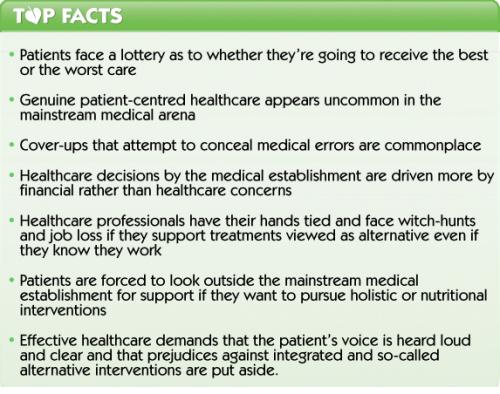
In trying to understand where our healthcare systems are at, it’s especially important to appreciate things from the patient’s perspective. The mainstream medical establishment is paying at least lip service to patient-centred healthcare delivery — but really, just how patient-centred has it become?
In this article, we’ve interviewed Janie Martel, an ex-professional skier and instructor and mother of two who has had more than two decades of intimate involvement with healthcare systems and professionals in the UK, Germany, the USA and elsewhere in the world. She has looked death in the face several times, and has been brought back from the brink by healthcare professionals on both sides of the divide: orthodox and non-orthodox.
Following Janie’s interview, we’ve included an opinion from a German clinician and former Food and Drug Administration (FDA) official, Dr Dana Flavin. Dr Flavin has not only many years of research and clinical experience working with cancer patients, especially in the USA, she also has unique insights derived from her work with the US food and drug regulator, the FDA. She has recently re-located back to her home country of Germany and acts also as Medical Director for the Foundation for Collaborative Medicine and Research that is working internationally to find and develop solutions for cancer with colleagues around the world.
We believe we can all learn important lessons from patients like Janie and clinicians like Dana. If implemented, these lessons could make for very different futures not only for many of us, but also for the younger generations when it comes to their time of need.
Interview with Janie Martel
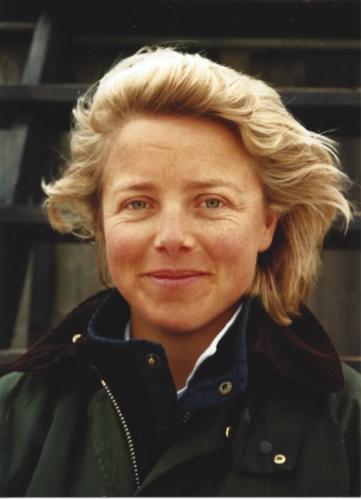
Janie Martel: against all odds
QUESTION 1: Janie, tell us your story. How did you get to have such an intimate experience of the medical system — both conventional and alternative?
I had hardly seen a doctor or hospital prior to an horrific accident in 1991. I was catapulted through the windscreen in a boating accident with ballistic force and suffered multiple injuries. This was the start of my long journey in the medical arena. Apart from brain damage, I suffered a host of other complications including meningitis, septicaemia, pneumonia, pulmonary embolism and cardiac arrest. I then developed very aggressive breast cancer. I have had over 23 years of hospitals. I wasn’t surprised when diagnosed with cancer. I believe it was the result of all the trauma, both physical and emotional, and I glow in the dark with the radiation I’ve been given.
I unfortunately suffered also from misdiagnosis of many medical problems and sadly received more damage than the original accident had caused. A tube, for example, in my spine led to an infection that wasn’t dealt with, resulting in a dangerous bacterial meningitis. I was then given the wrong drugs in another hospital and had a cardiac arrest. There were a host of cover-ups so no one took responsibility and nothing was done. I am far from alone in this kind of experience.
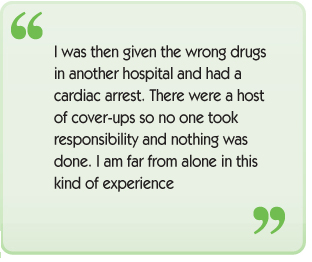
QUESTION 2: Based on your personal experience, what have been the best elements of conventional medicine that you’ve experienced?
Fate or luck determine which Accident and Emergency unit you’re taken to, and whether or not you receive the best or worst treatment for your long-term prognosis. Having been to so many hospitals all over the world, I’ve found that efficiency, communication, coordination and looking at the whole picture of the patient is vital to the outcome. Specialists often don’t talk to one another, so missing overlaps that can be detrimental both to the treatment and to the outcome. I cannot stress the importance here on how vital it is to look at the whole picture. The best hospitals and medics are those that ‘leave no stone unturned’, taking the patient as an individual. This has to be the best way forward. We should feel safe in our hospitals.
There are also a host of emerging treatments that might be regarded as alternative by some, but that’s only because they haven’t as yet been widely adopted because they’re relatively new and there are pressures against anything that rocks the chemotherapy and radiotherapy boat. These are things like DCA (dichloroacetate) and dendritic cell therapy, but the research and early results are amazing.
QUESTION 3: What elements of the conventional care you’ve been given do you believe have been most beneficial at critical stages of your care?
In my view, the best elements of conventional care come together when the clinician: a) listens to the patient; b) looks at the whole picture and treats the patient as an individual, in a humane way, and; c) looks at all treatment options and the patient’s likely reactions to them, while discussing all the relevant research and clinical information gathered so the patient can make an informed decision that will be in his or her best long-term interest.

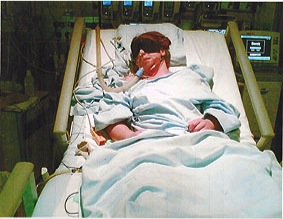
Janie Martel during some of her many hospital visits
QUESTION 4: You’ve developed close relationships and even friendships with some of the healthcare professionals that have managed your care over the years. What are the stand-out qualities of the three most important carers you’ve had, and what kinds of therapies and interventions have they offered?
Let’s use common sense. It’s clear that the best practice is to use the best of both worlds – mainstream where essential and a more natural and holistic approach wherever possible.
In my case, if it hadn’t been for the intervention of penicillin and other antibiotics when I got bacterial meningitis and septicaemia, I would have died. I am very grateful for them saving my life. But, in the UK, I’ve never encountered a single orthodox clinician who’s said, “Yes, you’re lucky to be alive, we now need to rebuild your immune system”. What’s so vital is to restore the function of the immune system after the devastating effects of both trauma and subsequent procedures that may often have harmful side effects.
I’ve done this by finding support elsewhere and it’s been vital and essential for my long-term prognosis. The doctors who have helped me most are the ones that listen, think, consult and come up with ideas. I don’t want to lie helpless in a hospital bed away from my sons. I don’t want to hear ‘nothing can be done’. I’m a fighter!
QUESTION 5: Many healthcare professionals are frightened to speak out about some of the problems they face within the mainstream medical establishment. But they often spill the beans to patients. What have you heard in relation to this?
Healthcare professionals have their hands tied. They are gagged. We should have total transparency and there should be freedom of speech on both sides. What has happened to democracy in the UK and many other countries that used to value it?
Professionals should be allowed and — indeed encouraged — to explore all avenues without the fear of being subjected to witch-hunts, which could cost them their positions or jobs. Their hands are tied and they appear to be controlled by the immensely powerful and greedy drug companies, which in turn seem to be primarily interested in monetary gain rather the patient’s well-being.
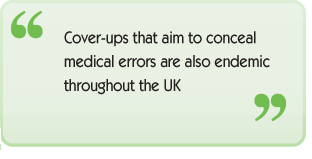
Cover-ups that aim to conceal medical errors are also endemic throughout the UK, both in the NHS and in private hospitals. I have been a victim of such cover-ups, and know others who have been too.
And then there’s the inability by so many doctors to get behind treatments that don’t support the medical establishment’s status quo.
A top professor in London said to me, and I had a witness in the room with me to hear this too: “We are not allowed to say, but the immune modulation regime that the Germans have put you on is amazing. You have defied all the odds and you must stick with it.”
It must be so frustrating for those professionals when they know that there are better treatments out there that they can’t either research or recommend.
QUESTION 6: In what ways have practices and interventions that the medical establishment might describe as ‘alternative’ been beneficial to your health, and what improvements have you been aware of anecdotally or empirically?
This is a huge topic. But for me, building-up the immune system, making sure gut absorption is reinstated and looking at all aspects of body and mind have been key. My philosophy is to put the very best fuel into the body – from living, organic foods through to the best nutritional supplements containing the essential trace minerals and other nutrients that are no longer in our soil or food chain. Would you put bad fuel into our car? So why put it into our bodies? This is one simple step I took with professional advice to give myself the best chance to help support my immune system.
Apart from excellent nutrition, exercise and relaxation are essential, all enabling the body to heal itself. These aren’t areas you get any support from in the mainstream medical arena so you have to look elsewhere for support.
QUESTION 7: How receptive have mainstream healthcare professionals been in hearing about the so-called alternative interventions you’ve experienced?
Healthcare professionals have their hands tied. They are unable to speak out, and they are not even allowed to show any interest.
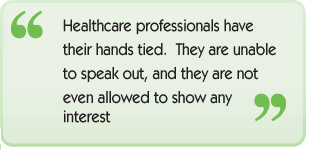
QUESTION 8: What patient support systems have you been able to benefit from, ranging from those offered by the mainstream medical system, through to alternative ones, like Yes to Life?
In the mainstream – what support? There is none. There’s of course plenty of talk but no action. Whereas in the alternative area, through the desperation among individuals and families over the possible loss of their loved ones, a range of charities and support groups have been set up that offer invaluable assistance. Two I have gained from especially in the UK at Yes to Life and CancerActive.
QUESTION 9: In terms of the support systems that are available, for cancer patient’s in particular, are they sufficient? Or do you think more, new and different forms of support should be available? If the answer is yes, what form might these take?
Cancer patients face a postcode lottery. Some areas are denied Macmillan nurses or help from hospices, like the southwest where I now live. It was much better when I previously lived in the North. Outside the medical establishment, new support boils down to the motivation among individuals and their ability to raise money. Both Chris Woollams from CancerActive and Robin Daly from Yes to Life lost daughters to cancer and that was their incentive. Chris Woollams has used a large amount of his own resources and Robin Daly has been successful in his diverse range of fundraising campaigns.
QUESTION 10: What is the single most important message you would want to communicate to those responsible for both conventional and non-conventional healthcare services?
The most important message to get across has got to be: listen to the patient, look outside the box and look at the whole picture of the patient both physically and mentally.
Opinion from Dr Dana Flavin
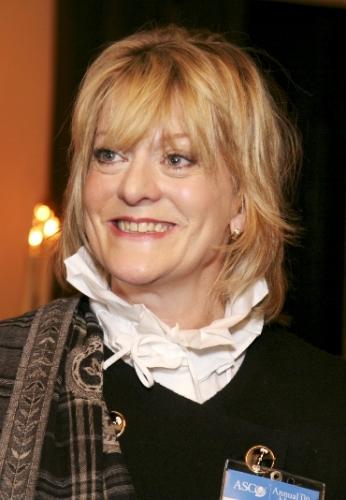
Dr Dana Flavin
Many doctors want to use complementary medicine or even alternative medicine but are afraid of the consequences and criticisms. Some just won't take the initiative, others are not even aware of the alternatives. It is difficult when hospitals are relying on incomes from patients and chemotherapy brings the most income, followed by surgery and radiation.
Yes, there are treatments that do reverse cancers and save lives, but they are difficult to get and are often necessary to combine with many other substances for synergism before one can see their efficacy. Cancer is not simple. Cancer cells are VERY smart and tumours release many chemicals, enzymes and even nitric oxide and lactic acid to depress the immune system and prevent it from fighting back against the cancer.
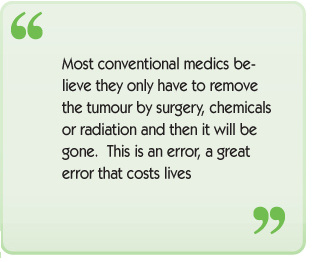
Most conventional medics believe they only have to remove the tumour by surgery, chemicals or radiation and then it will be gone. This is an error, a great error that costs lives. We need to work together internationally to combine our knowledge and reverse both the cancer and the immune suppression. The patients have no rights, they cannot decide for themselves what type of therapy they want as their vote is lost. I realize the government is trying to protect patients from being taken advantage of by charlatans and thieves, however there are legitimate doctors, practitioners and researchers who want to save lives and helping patients is their priority — not making money from them.
There needs to be a compromise so that patients can decide for themselves and not be punished by the government, the hospitals and insurance companies for deciding what type of therapy they want.
We need to give the patient’s body back to them and let them be the master of their fate, their future and their lives.
There are brilliant doctors around the world who are saving lives, who are researching daily to find better and new therapies for their patients. They are working from their very reasons for becoming doctors, compassion. It is in the Bible, the Torah, the Koran and other holy books, as well as in the teachings of Buddha, to help each other and to respect each and every human being’s right to their own life. Let us work to maintain these rights and let us move ahead with science and its support to determine the efficacies of these many therapies that have been shown to save lives. Let us stop witch-hunts and return to sanity in the 21st century and let us find those combinations and therapies that are the most effective and the least dangerous for quality of life and cures.
At a large cancer meeting I recently attended, an old, very experienced physician stood up and said; "I am sick and tired of keeping patients alive for a short period of time, only to have them suffer and die an expensive worthless death." All the physicians in the room were silent, and all were in agreement with his comment from his experience, and theirs. The future of medicine and the lives entrusted to this great institution for healing and cures are in our hands. It is time to change the direction of medicine, it is time to save lives TODAY!
Dr. Dana F. Flavin, former FDA Official, Physician, Pharmacologist, Toxicologist, Biochemist. Medical Director for the Foundation for Collaborative Medicine and Research. Working internationally to find and develop cures for cancer with colleagues around the world.








Comments
your voice counts
30 May 2013 at 9:51 am
Brilliant summary of the problems-but how to change it so that good scientifically proven advice can be taken on board and incorporated by doctors without fear of losing their careers/position/respect of colleagues seems to be the continual stumbling block.
It does seem we have to be the change we want-I got "thrown out" or asked to leave my wife's doctors office after asking what studies he had come across showing that cholestrol levels above 5 were a risk factor in heart disease-was made to feel rude for questioning his wisdom and recommendation.We never went for his Statin prescription immensley angering him but as we do not need regular contact it does not worry us-but it is a mild indication that you are there to do what you are told without much input or risk getting struck off.
As individuals we can start by interacting more,questioning more,being better informed so the doctors know they are talking to wiser individuals and the desire to get us in and out at their convenience might evolve into doing the right thing-which would save time and money for all long term.
Change happens slowly in big organisations-let us all chip away slowly to make it better
03 June 2013 at 2:12 pm
Thank you for sharing your story Janie it seems to me you are not just a fighter but one heck of an objective and reasonable person given the extremes of the care you received. Personally I take a bit of a more severe view, I believe we need to begin an investigation and hard look into the premise upon which the Radiotherapy and chemo therapy is based and it must be exposed once and for all as the mostly farce that it is. While there is for sure a role for conventional therapies I am certain it should almost never be the forefront of cancer treatment.
Your voice counts
We welcome your comments and are very interested in your point of view, but we ask that you keep them relevant to the article, that they be civil and without commercial links. All comments are moderated prior to being published. We reserve the right to edit or not publish comments that we consider abusive or offensive.
There is extra content here from a third party provider. You will be unable to see this content unless you agree to allow Content Cookies. Cookie Preferences